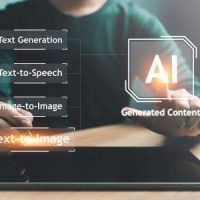AI and IP: The Potential Legal Ramifications AI Generated Content May Face

Artificial Intelligence (“AI”) has become a huge fascination and has the potential to be helpful in our everyday lives. The number of AI generators on the internet is becoming larger and more advance each year. For example, ChatGPT is a chatbot created by the Artificial Intelligence company OpenAI. The Chatbot has gained major popularity in recent months and is being used around the world in a variety of settings. ChatGPT allows users to type broad and/ or specific requests into the chat box and the chatbot will curate a well written and human like response. The Chatbot can be used to create a response for a number of different purposes, from writing warm emails to friends to writing pages of a term paper on Robots. The way the AI works is the program is “trained” on already existing text from millions of books, articles, and websites. This means that the generated responses are accumulated from works already in existence, but it is unclear how much the AI takes straight from those texts to form its responses.
While the innovation of ChatGPT has many excited for its future use, it leaves some concerned about the potential intellectual property (“IP”) issues that it may bring along. The system is still very new. There are two major issues in the IP realm of AI generated content: 1) is the content created by the AI bot copyrightable?; and, 2) can the AI bot be responsible for IP infringement?
The first issue depends upon the requirements of copyright law. AI generated content from popular sites like ChatGPT will likely not receive Copyright Protection under U.S. Law. The Copyright Act requires that a copyrighted work be an original work of authorship fixed in a tangible medium. While AI generated works may meet the standards for fixation and may even appear to be creative, they are not technically authored by a human, and they may not be considered original. For example, ChatGPT accumulates its responses using texts already created and in commerce, which some may argue means that the chatbot is not necessarily creating anything original. Originality and creativity are standard requirements for copyright protection and without them the U.S. Copyright Office will not approve the copyrightability of a work. But the biggest issue ChatGPT faces is authorship, which the U.S. Copyright Office has reaffirmed requires “human authorship … to support a copyright claim.” This issue was brought up by Steven Thaler, who developed his own AI system which generated images. Thaler attempted to copyright a piece entitled “The Entrance to Paradise” and in his application he named the AI database as the author. The Copyright Office denied his application for a lack of “human authorship” and when Thaler twice applied for reconsideration, the Copyright office again denied his applications. Thaler has filed suit and is currently fighting for court recognition of AI generated authorship. However, at this time it appears clear that works created by AI generation are not going to be considered protected by copyright laws.
The second issue remains very unclear and may require more time for courts to address. If AIs are using copyrighted materials in their responses, images, or texts then issues may arise between the author of the work and the developer of the program. Further, users of AI programs may take generated responses or images and use them not knowing that their use infringes on the copyrighted material that the AI used to create the response or image. Currently, Getty Images is suing Stable Diffusion (“Stability AI”) for infringing on their intellectual property rights. Getty claims that Stability AI is unlawfully copying their images and using them to generate other imitation images. Stability AI is claiming that Fair Use principles allow them to use the copyrighted images for a “transformative purpose.” Stability AI is also facing lawsuits against artists directly, who claim that the vendor acquired and copied their artwork without permission. The suit between Getty and Stability AI was filed on January 17, of 2023 and will likely have a lasting impact on AI and intellectual property communities.
Intellectual property law and artificial intelligence is fairly new, and it creates a lot of questions about the future of the law and the systems themselves. As more and more controversy falls to the court, we will have more answers about how these two concepts can work together.
If you have any questions about the legal impact of your artificial intelligence program or you believe that an AI generator has infringed on your intellectual property rights, talk to an experienced intellectual property attorney. At Perkins Law – Brand Protection we can help guide you through the difficulties of these issues. Reach out today at (561) 467-4001 to set up a consultation with our Florida based attorney.
